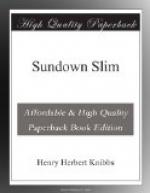Midway between the town of Antelope and the river Concho is the water-hole. The land immediately surrounding the water-hole is enclosed with a barb-wire fence. Within the enclosure is a ranch-house painted white, a scrub-cedar corral, a small stable, and a lean-to shading the water-hole from the desert sun. The place is altogether neat and habitable. It is rather a surprise to the chance wayfarer to find the ranch uninhabited. As desolate as a stranded steamer on a mud bank, it stands in the center of several hundred acres of desert, incapable, without irrigation, of producing anything more edible than lizards and horned toads. Why a homesteader should have chosen to locate there is a mystery. His reason for abandoning the place is glaringly obvious. Though failure be written in every angle and nook of the homestead, it is the failure of large-hearted enterprise, of daring to attempt, of striving to make the desert bloom, and not the failure of indolence or sloth.
Western humor like Western topography is apt to be more or less rugged. Between the high gateposts of the yard enclosure there is a great, twelve-foot sign lettered in black. It reads: “American Hotel.” A band of happy cowboys appropriated the sign when on a visit to Antelope, pressed a Mexican freighter to pack it thirty miles across the desert, and nailed it above the gateway of the water-hole ranch. It is a standing joke among the cattle- and sheep-men of the Concho Valley.
Sundown sat up and gazed about. The rabbit, startled out of its ordinary resourcefulness, stiffened. The delicate nostrils ceased twitching. “Good mornin’, little fella! You been travelin’ all night too?” And Sundown yawned and stretched. Down the road sped a brown exclamation mark with a white dot at its visible end. “Guess he don’t have to travel nights to get ’most anywhere,” laughed Sundown. He kicked back his blankets and rose stiffly. The luxury of his yawn was stifled as he saw below him the ranchhouse with some strange kind of a sign above its gate. “If that’s the hotel,” he said as he corded his blankets, “she don’t look much bigger than me own. But distances is mighty deceivin’ in this here open-face country.” For a moment he stood on the hillside, a gaunt, lonely figure, gazing out across the limitless mesas. Then he jogged down the grade, whistling.
As he drew near the ranch his whistling ceased and his expression changed to one of quizzical uncertainty. “That’s the sign, all right,—’American Hotel,’—but the hotel part ain’t livin’ up to the sign. But some hotels is like that; mostly front.”
He opened the ranch-house gate and strode to the door. He knocked timidly. Then he dropped his blanket-roll and stepped to a window. Through the grimy glass he saw an empty, board-walled room, a slant of sunlight across the floor, and in the sunlight a rusted stove. He walked back to the gateway and stood gazing at the sign. He peered round helplessly. Then a slow grin illumined his face. “Why,” he exclaimed, “it’s—it’s a joke. Reckon the proprietor must be out huntin’ up trade. And accordin’ to that he won’t be back direct.”




